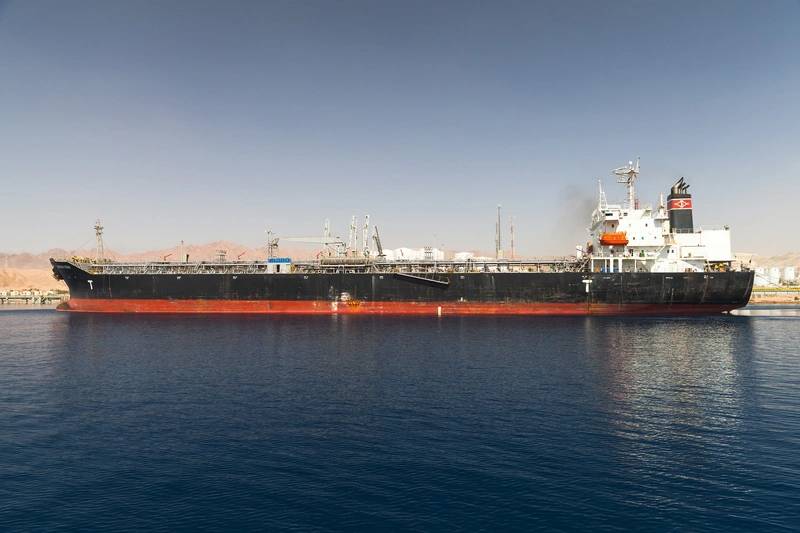Israel Aims to Boost Red Sea Oil Deliveries Despite Environmental Risks
Israel plans to allow more oil tankers to dock at a Red Sea port in Eilat despite environmental risks, as it strives to maintain energy security amid conflict on multiple fronts, according to Israeli officials and government documents.
Prime Minister Benjamin Netanyahu's office wants to revoke restrictions on the amount of oil that can be unloaded at a jetty in the city, which sits in the middle of a string of resorts and beaches and is adjacent to a fragile coral reef.

The curbs imposed in 2021 by the Environmental Protection Ministry and which effectively halted an oil supply deal with the United Arab Emirates, were eased temporarily late last year at the start of the Gaza war.
The jetty belongs to state-owned Europe Asia Pipeline Co (EAPC), which operates a pipeline across Israel connecting the Red and Mediterranean seas as an alternative for tankers crossing the Suez Canal.
EAPC wants to receive more oil but environmental regulators and Eilat's mayor oppose the plan.
With the war against Hamas setting off fighting with Hezbollah in Lebanon and drawing attacks from other Iranian proxies in Yemen, Iraq and even by Iran itself, Israel is pushing to ensure it can keep its economy running smoothly.
When its main energy source, the offshore Tamar gas field, was briefly shut at the outset of the war with Hamas, the country turned to supplies earmarked for export.
With Yemeni Houthis disrupting trade in the Red Sea, ships have diverted to Mediterranean ports. Utilities have built their own backup networks.
EAPC signed a deal to transfer large amounts of oil from the UAE to Europe through its pipeline in 2020, shortly after Israel and the UAE normalized ties, in one of the most significant partnerships to emerge from the U.S.-brokered Abraham Accords.
The deal was forecast to transfer tens of millions of tons of oil, meaning about 50 tankers docking at the crowded Eilat shoreline annually, the Environmental Protection Ministry said. The prior average was two.
The environment ministry took a hardline policy of "no additional risk" and set a limit of two million tons of oil, effectively blocking the deal.
Eilat's coral reef is unique in having proved more resilient to climate change, when many reefs around the globe are dying. It is also a big tourism draw. Its proximity to the jetty leaves it vulnerable to even the smallest leak from one tanker.
Despite those risks, Netanyahu's office recommended this month that the easing of restrictions be extended and broadened to include fuel for trade as well as domestic use, and even for capacity to unload oil products in Eilat to be expanded, an internal report seen by Reuters showed.
"The government of Israel does not take an approach of complete risk avoidance - not in security, not in energy and not in the environment," a ministerial committee formed by Yossi Shelley, director general of Netanyahu's office, said in the report which has not been made public.
"Not canceling the limitation of the 'no additional risk' policy, without managing the risk, and not expanding the distillates port might lead to the closure of the Eilat terminal and not allow the required response in times of emergency."
The committee instructed the environment ministry to come up with a plan to minimize risks from more oil deliveries.
The Environmental Protection Ministry wrote to Netanyahu's office on April 16 after receiving the report, and in its letter seen by Reuters said its concerns were ignored, the report's recommendations were unacceptable, and that it did not have the resources to regulate the proposed increase in deliveries.
In arguing its case, the ministry has cited past mishaps, like in 2014 when EAPC's pipeline burst, spilling millions of litres of oil into a nature preserve.
It was unclear whether removing the Eilat limitations would revive the UAE oil deal. Petromal, a unit of Abu Dhabi-based National Holding and one of the owners of the company that signed the deal with EAPC, did not immediately respond to a Reuters request for comment.
KEEPING THE OIL FLOWING
EAPC Chairman Erez Halfon welcomed the government's U-turn in a statement in which he said the war has made clear "the strategic, security and energy importance of EAPC's facility in Eilat."
Without constant oil deliveries, the Eilat facility will degenerate and become unreliable, EAPC said.
Nearly all Israel's trade, including energy deliveries, is seaborne and most happens along the Mediterranean coast in ports at Haifa, Ashdod and Ashkelon.
In 2023 Israel imported 267,000 barrels per day of crude oil, according to data from shipping analytics firm Kpler, mostly from Kazakhstan, Azerbaijan and Kurdistan.
The Emirati oil deal could be worth about $50 million a year for EAPC, according to the internal report.
Israel's Energy Ministry told Reuters that oil deliveries should be enough to economically sustain the terminal but need to be handled properly vis a vis the environment.
One government official dismissed an argument by the director general of the Environmental Protection Ministry that there were other ways to keep the jetty functioning.
"The professional position was clearly stated that any means other than operational activity will not be sufficient to keep that channel functioning," the official told Reuters.
The committee, the official emphasized, did not tell the Environmental Protection Ministry exactly how much oil should be permitted or how to conduct the survey, only that it be carried out. It gave the ministry three months to comply.
(Reuters - Additional reporting by Robert Harvey and Alexander Cornwell; Editing by Elaine Hardcastle)
